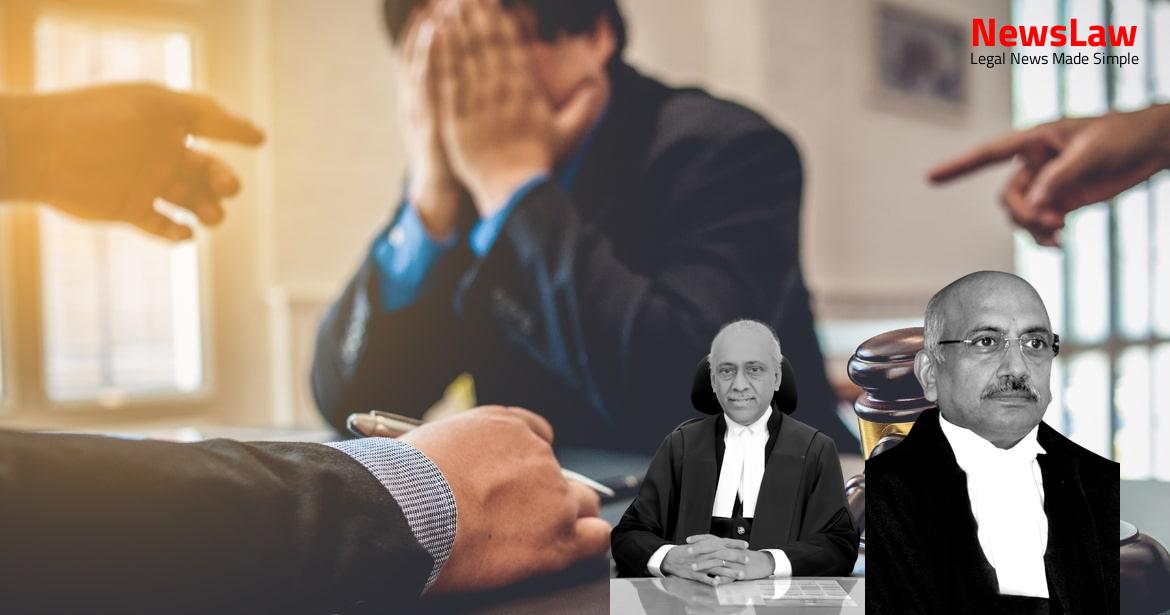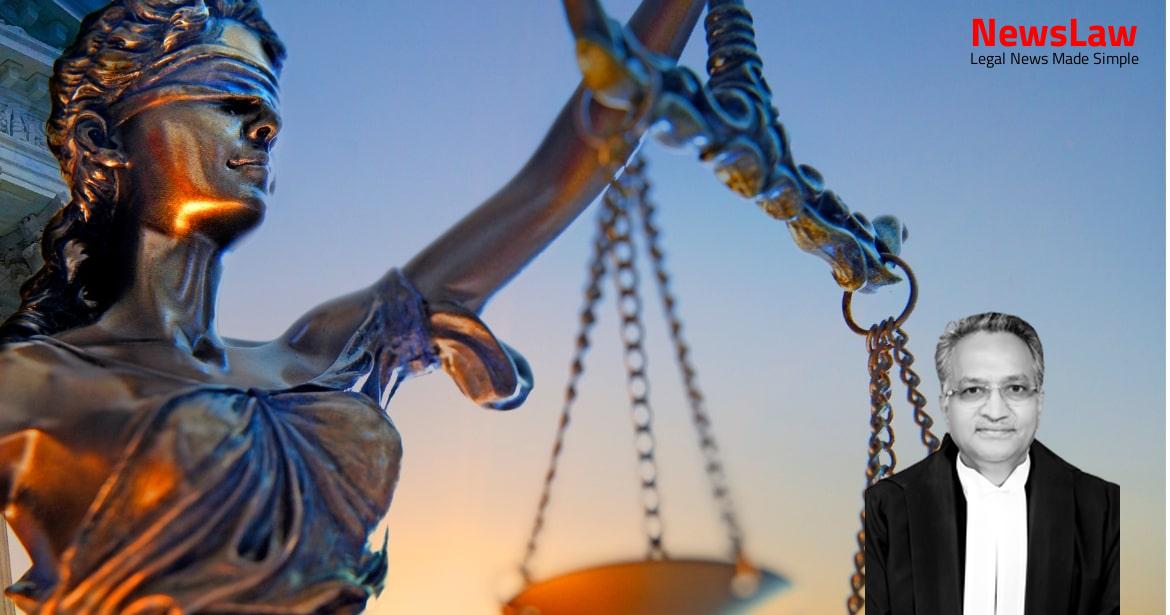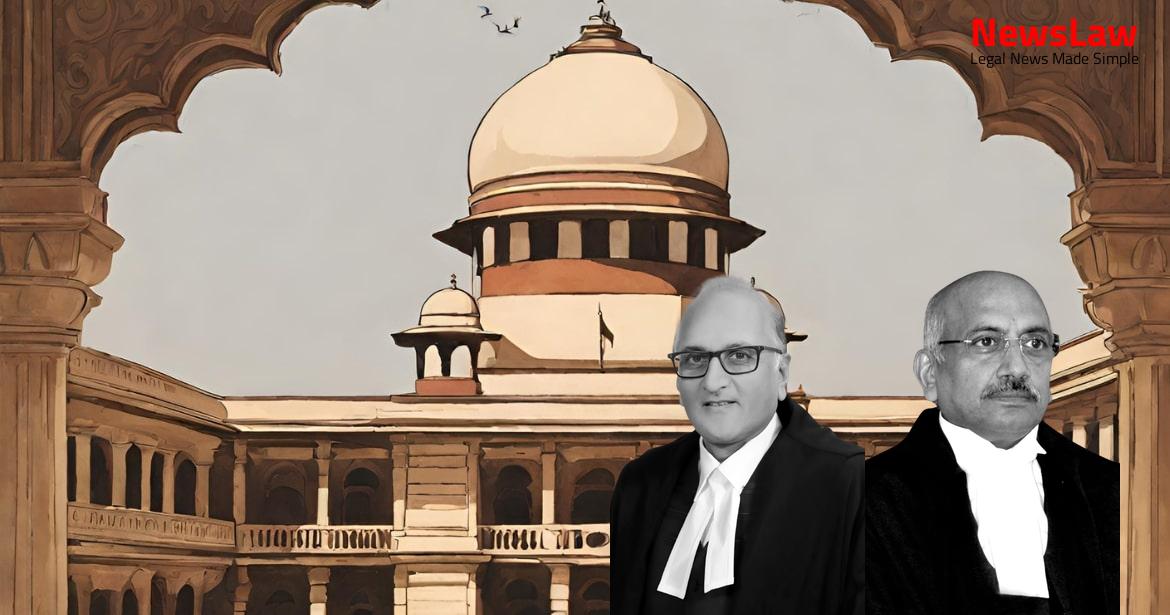In a recent legal case, the court delved into the complex legal analysis surrounding eligibility criteria under the 1989 Scheme. The court’s scrutiny and interpretation of the law play a pivotal role in determining the outcome of such cases, impacting the rights and entitlements of the parties involved. Let’s delve into the intricacies of the court’s legal analysis in this significant case.
Facts
- The Committee found that the applicant did not complete the required 240 days in 12 calendar months to be entitled to temporary status under the 1989 Scheme.
- The Tribunal’s decision in favor of the applicant was solely based on the Committee’s report dated 29.8.2005.
- The Tribunal’s order was challenged by the department through a Review application, which was dismissed without proper consideration.
- High Court directed the Tribunal to record evidence to resolve the factual controversy.
- The High Court dismissed the department’s writ petition based on the authenticity of documents produced by the applicant, upholding the Tribunal’s judgment favoring the respondent.
- The Tribunal reconsidered the matter, finding that the applicant had only worked for limited days in the years specified, despite some artificial breaks.
- The respondent claimed engagement for longer periods in the concerned years but failed to produce original documents to support this claim.
- The Committee found that the respondent did not fulfill the eligibility criteria of completing 240 days in 12 calendar months.
- Upon verification, the Committee observed that the respondent’s engagement days were well below the required 240 days in the year.
- BSNL authorities disputed the authenticity of the certificates relied upon by the respondent.
- A Committee was formed to verify records of casual workers for determining eligibility under the 1989 Scheme.
- The 1989 Scheme grants temporary status to casual workers who were working in BSNL on 1.10.1989, had at least one year of continuous service, and were engaged for at least 240 days within that period.
- The Union of Casual Labourers advocated for casual workers’ rights to secure temporary status.
Also Read: Interpretation of Market Fee Levy under Karnataka Agricultural Produce Marketing Act
Arguments
- Mr. Dinesh Agnani appeared for the appellant.
- Mr. Surendra Patri represented the respondent who was the original applicant before the Central Administrative Tribunal.
- The challenge is against the judgment and order dated 31.5.2018 of the Gauhati High Court.
- The High Court upheld the order of the Tribunal dated 25.8.2015 and directed conferment of temporary status to the respondent under the Casual Labourers (Grant of Temporary Status and Regularization) Scheme of the Department of Telecommunications, 1989.
- The appellant also challenges the order dated 4.6.2019.
- The appellant’s counsel argues that the respondent did not work for 240 days in 12 months and therefore is ineligible for benefits under the 1989 Scheme.
- The competent committee also found the respondent ineligible.
- There was no justification for the Tribunal or the High Court to favor the respondent with incorrect factual findings without evidence or acceptable material.
- Photostat copies of documents provided by the respondent did not match departmental records, raising doubts about authenticity.
- The Tribunal and High Court could not have concluded that the respondent fulfilled eligibility criteria without verifying the authenticity of the documents.
- The respondent has been litigating for a long time for benefits under the 1989 Scheme and since both the Tribunal and the High Court ruled in his favor, interference by the Court is argued against.
Also Read: Legal Analysis of Arbitration Order Quashed
Analysis
- Committee Report highlighted lack of original records to support the applicant’s claim.
- Certificates issued by unauthorized persons without established authenticity.
- 1989 Scheme required 240 days of engagement in a calendar year for temporary status.
- The Committee found the respondent served only 38 days in a calendar year, rendering him ineligible.
- Tribunal’s reliance on Uma Devi to set a ten-year service yardstick for eligibility.
- Regularisation of irregularly appointed workers as a one-time measure is recommended.
- The process of regularisation should be initiated within six months from the specified date.
- Existing regularisations need not be revisited unless under legal scrutiny.
- Avoid any further bypassing of constitutional requirements in appointments.
- The applicants were unable to prove any issues with the Committee’s findings.
- The period of engagement spanning multiple years was not in line with the one-year requirement of the Scheme.
- Treating gaps in service over years as ‘artificial breaks’ was deemed unacceptable.
- This method of calculation did not align with the Uma Devi ruling and the criteria set by the Respondent.
- The Tribunal’s order from 22.01.2010 highlighted the failure of the applicants to meet the engagement requirement of 240 days in any year.
Also Read: Judicial Scrutiny in Matrimonial Disputes
Decision
- The judgments dated 31.5.2018 and 4.6.2019 of the High Court and the order dated 25.8.2015 of the Tribunal in T.A. No. 30/2009 are found to be unsustainable.
- The above judgments and order are set aside and quashed.
- The appeals are allowed without any order on cost.
- The order of the Tribunal was previously interfered with and remanded by the High Court.
Case Title: BHARAT SANCHAR NIGAM LTD. Vs. SRI DEO KUMAR RAI @ DEO KUMAR RAY (2021 INSC 891)
Case Number: C.A. No.-007707-007708 / 2021



